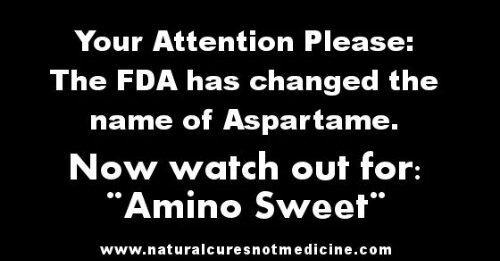 Apparently the public caught on to the illnesses associated with aspartame and the FDA is scrambling to change the name to Amino Sweet.
Apparently the public caught on to the illnesses associated with aspartame and the FDA is scrambling to change the name to Amino Sweet.
Proof of cancer causing effects of aspartame or its new alias “aminosweet”
Questions about artificial sweeteners and cancer arose when early studies showed that cyclamate in combination with saccharin caused bladder cancer in laboratory animals. However, results from subsequent carcinogenicity studies (studies that examine whether a substance can cause cancer) of these sweeteners have not provided clear evidence of an association with cancer in humans. Similarly, studies of other FDA-approved sweeteners have not demonstrated clear evidence of an association with cancer in humans. Aspartame
Aspartame, distributed under several trade names (e.g., NutraSweet® and Equal®), was approved in 1981 by the FDA after numerous tests showed that it did not cause cancer or other adverse effects in laboratory animals. Questions regarding the safety of aspartame were renewed by a 1996 report suggesting that an increase in the number of people with brain tumors between 1975 and 1992 might be associated with the introduction and use of this sweetener in the United States. However, an analysis of then-current NCI statistics showed that the overall incidence of brain and central nervous system cancers began to rise in 1973, 8 years prior to the approval of aspartame, and continued to rise until 1985. Moreover, increases in overall brain cancer incidence occurred primarily in people age 70 and older, a group that was not exposed to the highest doses of aspartame since its introduction. These data do not establish a clear link between the consumption of aspartame and the development of brain tumors.
In 2005, a laboratory study found more lymphomas and leukemias in rats fed very high doses of aspartame (equivalent to drinking 8 to 2,083 cans of diet soda daily) (1). However, there were some inconsistencies in the findings. For example, the number of cancer cases did not rise with increasing amounts of aspartame as would be expected. An FDA statement on this study can be found at http://www.fda.gov/NewsEvents/Newsroom/PressAnnouncements/2006/ucm108650.htm on the Internet.
Does aspartame cause cancer?
Researchers use 2 main types of studies to try to determine if a substance or exposure causes cancer. (A substance that causes cancer or helps cancer grow is called a carcinogen.)
In studies done in the lab, animals are exposed to a substance (often in very large doses) to see if it causes tumors or other health problems. It’s not always clear if the results from these types of studies will apply to humans, but lab studies are the best way to find out if a substance has the potential to cause cancer in humans before widespread exposure occurs.
Another type of study looks at cancer rates in different groups of people. Such a study might compare the cancer rate in a group exposed to a substance versus the rate in a group not exposed to it, or compare it to what the expected cancer rate would be in the general population. Human studies can sometimes be hard to interpret, because there may be other factors affecting the results that are hard to account for.
In most cases neither type of study provides definitive evidence on its own, so researchers usually look at both lab-based and human studies if they are available.
http://m.cancer.gov/topics/factsheets/artificial-sweeteners
